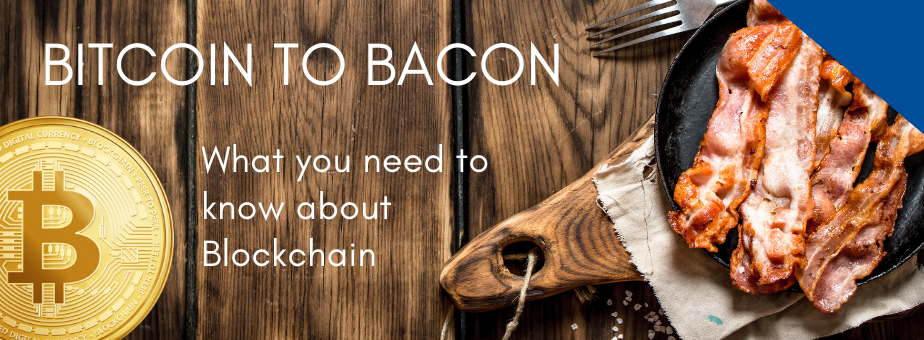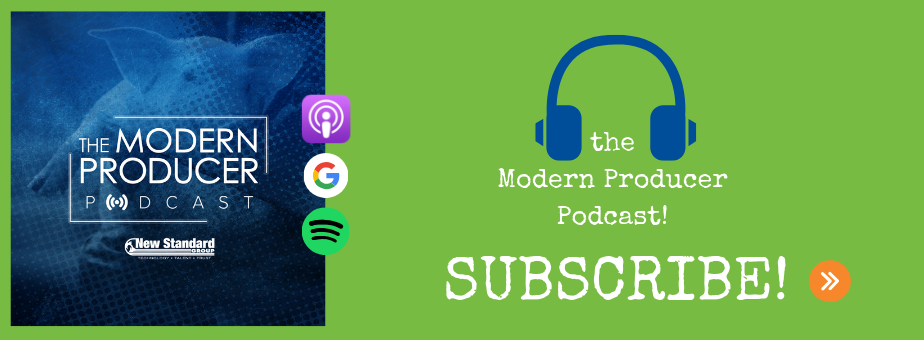
Bitcoin, cryptocurrency, blockchain—it all sounds like made up tech lingo, right?
Well believe it or not, the technology fueling the cryptocurrency phenomenon is headed to a hog barn near you. As producers, it's time to get familiar with blockchain and how it’s going to impact your operation.
What exactly is blockchain?
Blockchain technology originated with cryptocurrency; a technology that allows digital information to be distributed, but never copied.
In its purest form, blockchain is a time-stamped series of permanent records of data, managed by a cluster of computers not owned by any single entity. Each block of data is secured and chained to another using other cryptographic principles. (Source: Blockchain and Finance: Two Peas in a Pod - Blockgeeks. https://blockgeeks.com/guides/blockchain-and-finance/)
In other words, blockchain is a digital ledger—the information cannot be altered, and it is all digitally linked. Utilizing this technology in packhouses, for example, would allow the packer to see when pigs will be ready for delivery to the plant. Additionally, vets could see health trends of specific animals right from their desk.
What makes it so special?
A blockchain network has no central authority—it’s the definition of a democratized system. Since it’s a shared and immutable ledger, the information can be opened for anyone and everyone to see while still remaining secure.
As such, anything on the blockchain is by nature transparent, and everyone involved is accountable for their actions. (source: What is Blockchain Technology? A Step-by-Step Guide For .... https://blockgeeks.com/guides/what-is-blockchain-technology/
What does this have to do with pigs?
Blockchain technology is finding its way into numerous fields. From helping the world's impoverished to preventing voter fraud, the technology has endless applications.
In the case of pork production, blockchain makes it possible to create a whole new level of transparency. This form of data sharing will not only make producers more efficient and productive, but it will also allow consumers to get the details on the food they are purchasing.
Where did it all begin?
Food safety has been a big driver in the push to implement blockchain.
In 2017, Wal-Mart and IBM teamed up to implement blockchain in the tracking of fresh produce, like kale, romaine, and lettuce. Blockchain allows Wal-Mart to track the product’s lifespan, from the planting of the seed to the fertilizers or chemicals applied when it was harvested, to its shipping and delivery.
Every step of the way, data is being collected and shared. By gathering this information in one place, Wal-Mart can ensure freshness, safety, and spot issues before products even hit the shelves. Wal-Mart has since made it a requirement for leafy green producers to implement these reporting systems by late 2019.
The other primary driver of blockchain is the consumer’s demand for information.
Pork producers in China are adopting this technology to meet the demands of their consumers. The level of transparency demanded by importers requires data to be shared.
Consumers want to know where their food comes from, along with details on how the animals were raised, treated, what antibiotics were used, and more. On a smaller scale, Europe is introducing labels that allow customers to scan a QR code and view a detailed timeline of the pigs’ lives.
The technology is here. It’s only a matter of time before we see a more extensive demand and rollout of this type of data.
Is blockchain secure?
Security is always a primary concern when it comes to data. Currently, blockchain is very secure and unable to be tampered with. Since the data cannot be altered after its entry, it will remain accurate.
As far as who can see the information, you’re currently in charge of that decision. From employees to vets and genetics companies, you decide how your information is shared.
Why should I care?
Ultimately, blockchain will significantly improve your productivity and efficiency. If either of those things are important to you, take note. Let's look at some examples of how sharing data can improve your bottom line.
Genetics
When data is shared with genetics companies, they are able to track the best pigs and alter their breeding programs to create the most productive animal possible. With the amount of data being harvested, the idea of super-pigs is not far off.
Veterinarians
The ability to monitor animals and farms from afar will save a lot of time and energy. Being able to see trends in sow’ watering and feeding habits, or even their temperature, can indicate warning signs for illness before the pig even knows she's getting sick. Additionally, the lessened amount of travel time and biosecurity risk may be reason enough to make these updates.
Processors
The possibility of seeing what animals are coming and going is a huge benefit, not only for processes but also producers. They would avoid fees for over and underweight animals, and there would also be transportation benefits: from seeing where trucks have been, to increasing efficiency in logistics, and finally, monitoring biosecurity and health issues.
Consumers
Information is powerful. End users will see a new level of transparency, not only in the quality of the meat they are purchasing but also their assurance that the meat is safe. Producers who are already experimenting with sharing this data on labeling are seeing increases in sales.
How can I prepare for these coming changes?
You don’t have to build a new barn to start getting the benefits of the blockchain. It really comes down to systems and equipment updates.
Data can be collected from farrowing feeders to fine-tune milk production, and from the finishing barns to fine-tune weights with diet control. Every barn is different, and all producers have their own needs.
Our biggest suggestion is simply to get started. Don't get left behind.
Change is coming faster than you might think. Producers can still get ahead of the curve, and there’s no doubt that adopting this technology today will positively affect your bottom line.
For the latest on blockchain and more industry trends and news, make sure you follow the Modern Producer Podcast.





